 Backend Development
Backend Development
 PHP Tutorial
PHP Tutorial
 Detailed introduction to online PHP running tools and database controllable example codes
Detailed introduction to online PHP running tools and database controllable example codes
Detailed introduction to online PHP running tools and database controllable example codes
As a PHP novice, it would be great if there was a useful tool for practicing grammar anytime and anywhere. Obviously, the above PHP online tool can basically meet normal needs.
But the only drawback is that it does not support databases and other advanced features. So this seems very embarrassing. If you can't practice database statements, you're still learning a lot. So it’s better to do it yourself, write an online tool that can support the database, and use it yourself.
Implementation ideas
For PHP files, when the browser sends a URL request to the server, the interpreter will automatically translate the file into a part that the browser can parse. So the process of accessing the URL is the process of obtaining the data interpreted by PHP.
Brief explanation
The following is a brief explanation. For example, we have such a temp.php file, the content is as follows:
<?php echo "Hello PHP";
When the browser accesses, the data obtained is as follows: 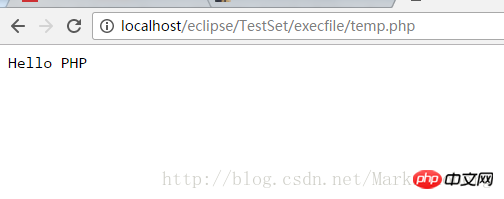
Tool Principle
Since the above temp.php file can work like this, then just imagine, if we put the file we want to run in the temp.php file in advance, and then access this temp.php file, wouldn't we be able to get it? The desired result.
In fact, this is what I did, and the results proved that if the order is correct, it is quite good.
My idea is:
Give me a button. When the button is clicked, the source code will first be sent to the server, and then an ajax request will be called to run the source code. The results are taken out and displayed on the "console".
Production
The specific implementation process will be introduced below.
main.php
<!DOCTYPE html>
<html>
<head>
<meta charset="UTF-8">
<title>我自己的PHP工具</title>
<link rel="shortcut icon" href="favicon.ico" type="image/x-ico" />
<style>
.container {
width: 1356px;
height: 640px;
position: absolute;
background: #CCC;}
.left {
width: 50%;
height: 100%;
background: lightgray;
position: relative;
float: left;}
.header {
width: auto;
height: 61px;}
input {
width: 180px;
height: 60px;
position: relative;
background: lightgreen;
float: right;
margin-right: 12px;
margin-top: 6px;
border-radius: 25px;
box-shadow: 1px 1px 1px #6e6e6e;}
.panel {
width: 90%;
height: 540px;
align: center;}
textarea {
font-size: 28px;}
.right {
width: 50%;
height: 100%;
background: deepskyblue;
position: relative;
float: right;}
</style>
</head>
<body>
<p class="container">
<p class="left">
<p class="header">
<label><font size="5">在下面写上您的PHP代码.</font>如: echo "Hello 郭璞";</label>
<input id="btn_run" type="submit" value="点击运行"></input>
</p>
<hr>
<p class="panel">
<textarea id="source" style="width: 645px; height: 540px;"
name="source" placeholder="echo 'Hello World!';">
</textarea>
<!-- <textarea type="hidden" id="hidden" hidden></textarea> -->
</p>
</p>
<p class="right">
<h2 id="下面将显示出您的代码的执行结果">下面将显示出您的代码的执行结果</h2>
<hr>
<p class="panel">
<textarea id="result" style="width: 645px; height: 540px;">
</textarea>
</p>
</p>
</p>
<!-- 编写提交脚本,并获取返回结果 -->
<script src="./js/jquery-2.2.4.min.js"></script>
<script>
// 请求运行结果
function getResult() {
$.ajax({
type : "GET",
url : "./temp.php",
success : function(data) {
document.getElementById("result").value = data;
},
error : function(err) {
document.getElementById("result").value = err;
}
});
} // 将源代码上传到服务器上
function uploadSource() {
var source = document.getElementById("source").value;
$.ajax({
type: "POST",
url: "./main.php",
data: {
"source": source
},
success: function(){
console.log("代码上传成功!");
},
error: function(err){
console.log("代码上传失败!");
alert(err);
}
});
} // 使用ajax来 获取执行的结果
$(document).ready(function() {
document.getElementById("result").value = "正在获取运行结果··· ···";
$("#btn_run").click(function(){
// 先上传代码
uploadSource(); // 请求代码运行后的结果
getResult();
});
}); </script>
<!-- 编写php脚本,获取提交信息 -->
<?php
$source = $_POST ['source']; $source = "<?php " . $source;
file_put_contents ( "./temp.php", $source ); ?></body></html>Upload source code
<!-- 编写php脚本,获取提交信息 -->
<?php
$source = $_POST ['source'];
$source = "<?php " . $source;
file_put_contents ( "./temp.php", $source ); ?>After this code, you can upload the edited source code to the specified temp.php on the server, and then The preparation process is over.
ajax
Here ajax plays two roles:
One is to upload the source code
One is to get the code running results
Upload the source code
// 将源代码上传到服务器上
function uploadSource() {
var source = document.getElementById("source").value;
$.ajax({
type: "POST",
url: "./main.php",
data: {
"source": source
},
success: function(){
console.log("代码上传成功!");
},
error: function(err){
console.log("代码上传失败!");
alert(err);
}
});
}Get the running results
// 请求运行结果
function getResult() {
$.ajax({
type : "GET",
url : "./temp.php",
success : function(data) {
document.getElementById("result").value = data;
},
error : function(err) {
document.getElementById("result").value = err;
}
});
}Trigger timing
According to the requirements, only The upload and download process will only be executed when the Run button is clicked. So you only need to add a click event to the button.
$(document).ready(function() {
document.getElementById("result").value = "正在获取运行结果··· ···";
$("#btn_run").click(function(){
// 先上传代码
uploadSource();
// 请求代码运行后的结果
getResult();
});
});Demo
There happens to be an Alibaba Cloud server, so let’s put it on it. In this way, you can have an online PHP environment that can be used normally anytime and anywhere.
Homepage
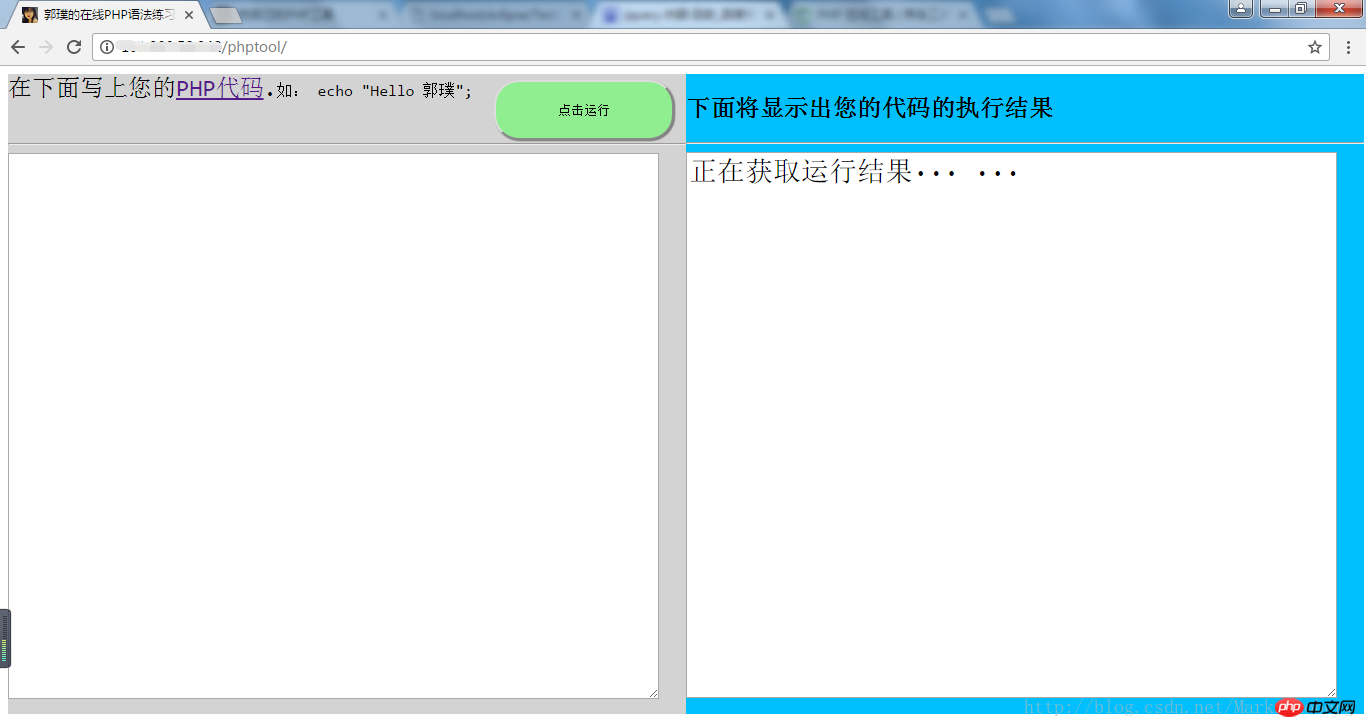
Click "PHP Code" and a prompt will be given
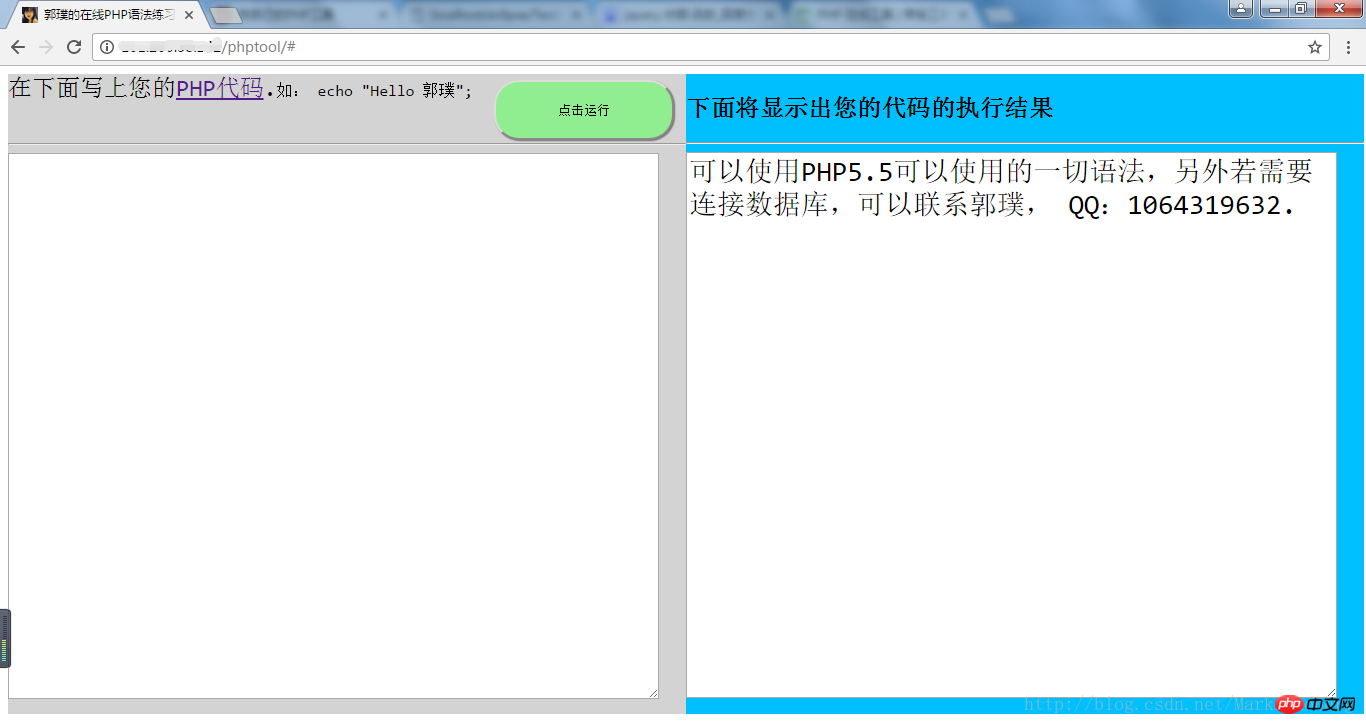
Regular Code
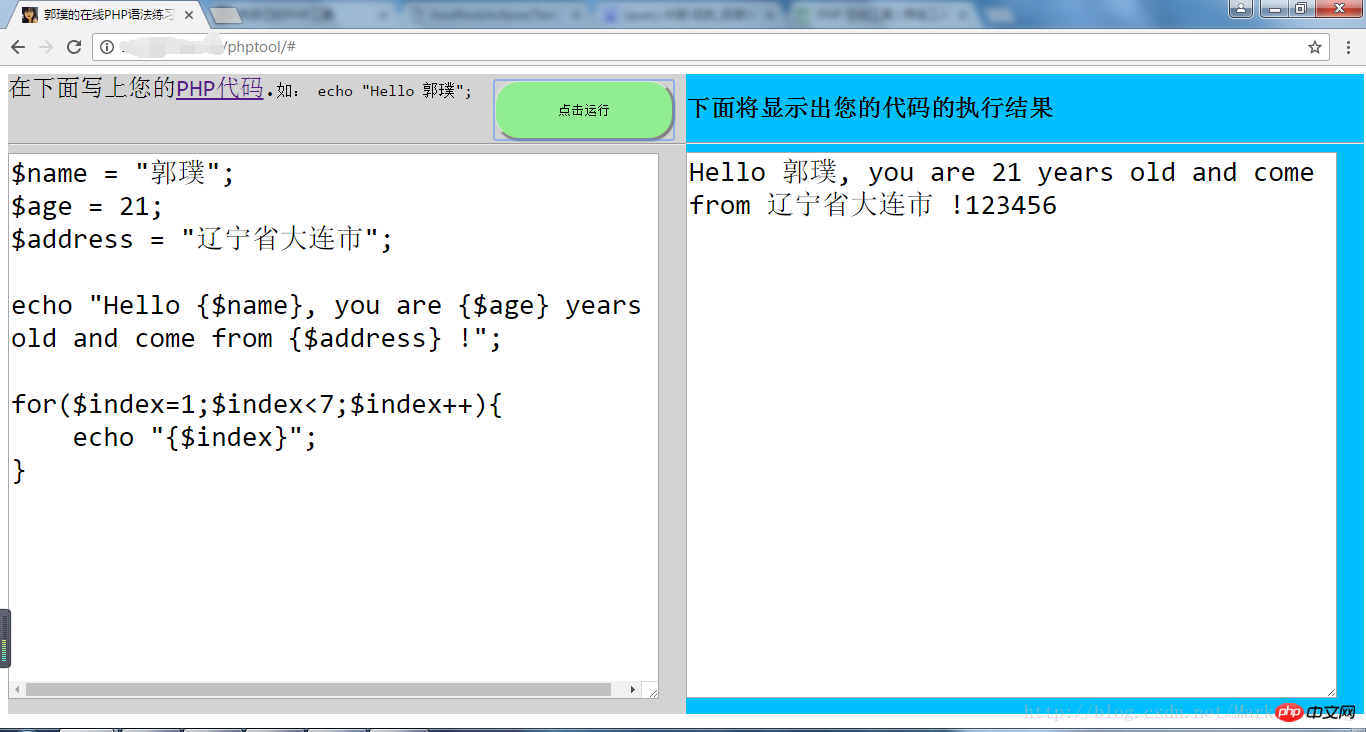
Operation database
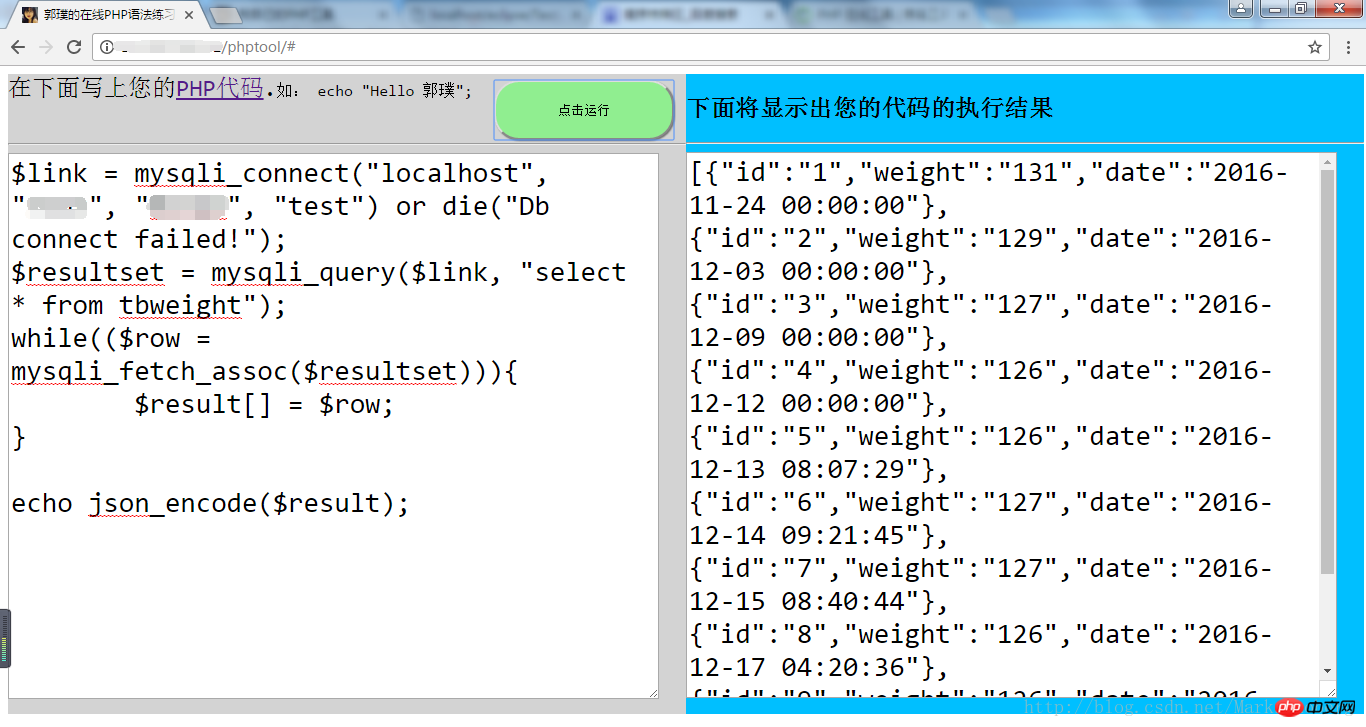
Summary
Finally, to review, this article mainly introduces how to implement a Online PHP editing tool. Satisfy your own needs for operating databases.
Another important point is that the reason why a form is not used is to submit/upload the source code. This is because if you use a form, once it is submitted, all the information on the fields in the original form will disappear, which is not conducive to subsequent code debugging and modification. If you use ajax to submit, there are not so many restrictions, but you can design more freely.
The above is the detailed content of Detailed introduction to online PHP running tools and database controllable example codes. For more information, please follow other related articles on the PHP Chinese website!

Hot AI Tools

Undresser.AI Undress
AI-powered app for creating realistic nude photos

AI Clothes Remover
Online AI tool for removing clothes from photos.

Undress AI Tool
Undress images for free

Clothoff.io
AI clothes remover

Video Face Swap
Swap faces in any video effortlessly with our completely free AI face swap tool!

Hot Article

Hot Tools

Notepad++7.3.1
Easy-to-use and free code editor

SublimeText3 Chinese version
Chinese version, very easy to use

Zend Studio 13.0.1
Powerful PHP integrated development environment

Dreamweaver CS6
Visual web development tools

SublimeText3 Mac version
God-level code editing software (SublimeText3)

Hot Topics
 1655
1655
 14
14
 1414
1414
 52
52
 1307
1307
 25
25
 1254
1254
 29
29
 1228
1228
 24
24
 PHP and Python: Comparing Two Popular Programming Languages
Apr 14, 2025 am 12:13 AM
PHP and Python: Comparing Two Popular Programming Languages
Apr 14, 2025 am 12:13 AM
PHP and Python each have their own advantages, and choose according to project requirements. 1.PHP is suitable for web development, especially for rapid development and maintenance of websites. 2. Python is suitable for data science, machine learning and artificial intelligence, with concise syntax and suitable for beginners.
 PHP: A Key Language for Web Development
Apr 13, 2025 am 12:08 AM
PHP: A Key Language for Web Development
Apr 13, 2025 am 12:08 AM
PHP is a scripting language widely used on the server side, especially suitable for web development. 1.PHP can embed HTML, process HTTP requests and responses, and supports a variety of databases. 2.PHP is used to generate dynamic web content, process form data, access databases, etc., with strong community support and open source resources. 3. PHP is an interpreted language, and the execution process includes lexical analysis, grammatical analysis, compilation and execution. 4.PHP can be combined with MySQL for advanced applications such as user registration systems. 5. When debugging PHP, you can use functions such as error_reporting() and var_dump(). 6. Optimize PHP code to use caching mechanisms, optimize database queries and use built-in functions. 7
 PHP in Action: Real-World Examples and Applications
Apr 14, 2025 am 12:19 AM
PHP in Action: Real-World Examples and Applications
Apr 14, 2025 am 12:19 AM
PHP is widely used in e-commerce, content management systems and API development. 1) E-commerce: used for shopping cart function and payment processing. 2) Content management system: used for dynamic content generation and user management. 3) API development: used for RESTful API development and API security. Through performance optimization and best practices, the efficiency and maintainability of PHP applications are improved.
 MySQL: Simple Concepts for Easy Learning
Apr 10, 2025 am 09:29 AM
MySQL: Simple Concepts for Easy Learning
Apr 10, 2025 am 09:29 AM
MySQL is an open source relational database management system. 1) Create database and tables: Use the CREATEDATABASE and CREATETABLE commands. 2) Basic operations: INSERT, UPDATE, DELETE and SELECT. 3) Advanced operations: JOIN, subquery and transaction processing. 4) Debugging skills: Check syntax, data type and permissions. 5) Optimization suggestions: Use indexes, avoid SELECT* and use transactions.
 PHP vs. Python: Understanding the Differences
Apr 11, 2025 am 12:15 AM
PHP vs. Python: Understanding the Differences
Apr 11, 2025 am 12:15 AM
PHP and Python each have their own advantages, and the choice should be based on project requirements. 1.PHP is suitable for web development, with simple syntax and high execution efficiency. 2. Python is suitable for data science and machine learning, with concise syntax and rich libraries.
 PHP vs. Other Languages: A Comparison
Apr 13, 2025 am 12:19 AM
PHP vs. Other Languages: A Comparison
Apr 13, 2025 am 12:19 AM
PHP is suitable for web development, especially in rapid development and processing dynamic content, but is not good at data science and enterprise-level applications. Compared with Python, PHP has more advantages in web development, but is not as good as Python in the field of data science; compared with Java, PHP performs worse in enterprise-level applications, but is more flexible in web development; compared with JavaScript, PHP is more concise in back-end development, but is not as good as JavaScript in front-end development.
 PHP's Purpose: Building Dynamic Websites
Apr 15, 2025 am 12:18 AM
PHP's Purpose: Building Dynamic Websites
Apr 15, 2025 am 12:18 AM
PHP is used to build dynamic websites, and its core functions include: 1. Generate dynamic content and generate web pages in real time by connecting with the database; 2. Process user interaction and form submissions, verify inputs and respond to operations; 3. Manage sessions and user authentication to provide a personalized experience; 4. Optimize performance and follow best practices to improve website efficiency and security.
 PHP and Python: Code Examples and Comparison
Apr 15, 2025 am 12:07 AM
PHP and Python: Code Examples and Comparison
Apr 15, 2025 am 12:07 AM
PHP and Python have their own advantages and disadvantages, and the choice depends on project needs and personal preferences. 1.PHP is suitable for rapid development and maintenance of large-scale web applications. 2. Python dominates the field of data science and machine learning.



